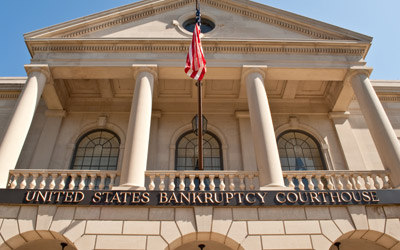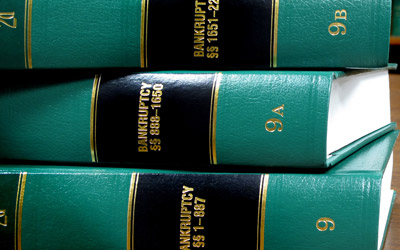Bankruptcy Articles
Debts That Follow You to the Grave
Section 523 deals with particular claims. These are the debts that may “follow you to the grave.” There are at least 18 specific categories of claims that currently are excepted from discharge pursuant to 523 under the current bankruptcy law. Below is a checklist of the major 523 exceptions. If your debts fall into these categories, then obtaining a complete “fresh start” in bankruptcy may not be possible under chapter 7, and you may need to explore other alternatives, such as chapter 13.
A. Taxes. As a general rule of thumb, (a) income taxes less than three years old from when they first came due are not dischargeable, and (b) trust fund taxes are not dischargeable no matter when they were incurred. Trust fund taxes include an individual debtor’s liability for corporate or other business employee withholding taxes (941 taxes). There is no time limit on those taxes, and they are just not dischargeable. Under certain state laws, some kinds of employee taxes and sales taxes are considered trust fund taxes and are equally not dischargeable.
Income taxes that are more than three years old may be discharged as long as the debtor filed a return and an offer in compromise is not pending or has not been pending for approximately eight months prior to the filing. Furthermore, fraudulent returns or tax obligations that arise from tax evasion schemes also may not be dischargeable and are not necessarily subject to the three-year rule.
B. Money/services obtained by fraud. This category includes money, services, refinancing, or renewals of credit obtained by fraud, false pretenses, or false representations. The case law generally follows common law or state law fraud elements. If you obtain money legally but attempted after the fact to hide or conceal it from a creditor, or if you mislead the creditor that concern what assets may be available for collection of the balances due, then such a situation would not create a non-dischargeable obligation. Non-dischargeability arises from originally obtaining the money by fraudulent circumstances.
The burden of proof is based upon a preponderance of evidence. This burden is less than that in common law and state law fraud cases, where fraud generally needs to be proven by clear, cogent, and convincing evidence. Consequently, it may be possible to prove the non-dischargeability of the debt but not liability for the debt itself.
Any person who considers filing for bankruptcy must be cautioned about using credit cards or taking out cash advances on the eve of bankruptcy. Under the old rules, any purchase of more than $1,225 worth of “luxury goods or services” or any similarly valued cash advance from an individual creditor within a period of 60 days prior to the bankruptcy filing is presumed to be fraudulent—and therefore non-dischargeable. The new bankruptcy code, lowered the presumptive threshold to $250 on luxury goods and $750 for cash advances, and it increases the look-back to 90 days (70 days for cash advances). Given these rules, great care should be taken if you are filing an emergency case. The stakes are high and the risks many.
C. Unlisted creditors. Any creditors who are not listed or scheduled may not be discharged unless they have actual knowledge of the bankruptcy. In some circuits this is not the case, however, and the courts have held that in “no asset” consumer chapter 7 bankruptcy, wherein creditors have not received a dividend and a creditor is not otherwise prejudiced, the failure to list a creditor does not automatically except the debt from discharge. Thus, it is extremely important to be thorough when you meet with your lawyer to prepare your case.
D. Defalcation/fraud in a fiduciary capacity. These kinds of debts arise when a debtor has a fiduciary duty to a creditor, such as holding funds in trust, operating under a power of attorney, and/or as an employee or other capacity entailing a fiduciary duty between the parties. Embezzlement is an example.
E. Alimony maintenance and child support. Child support and alimony are not dischargeable. Attorney fees incurred to establish maintenance, alimony, or child support are equally not dischargeable. Property settlement agreements may be dischargeable, but there is an exception if it creates a hardship on the ex-spouse. The decision of whether the obligation is support or property distribution is a question of federal bankruptcy law, not state divorce law.
F. Willful and malicious injury. Whether an injury to another person or to the property of another person is the result of “willful and malicious” conduct has been the subject of substantial litigation. Both elements are necessary. Willful means that the debtor acted purposefully. Malicious has been defined as knowing that the act is likely to or will cause an injury or harm. The injury or harm does not need to be substantial or severe to fall under the definition of maliciousness; the mere knowledge that the action is likely to cause an injury has generally been deemed sufficient. If the debtor knew what she was doing, did it on purpose, and knew it would probably cause some type of injury or damage, the resulting debt is non-dischargeable.
G. Governmental fine, penalty, or forfeiture. This section is a little less used but essentially covers those types of debts, such as court fines, fines by governmental agencies for violating statutes (such as environmental fines or MVS surcharges), and other types of governmental fines or penalties for violating a statute or regulation.
H. Student loans. Most student loans are now insured or guaranteed by a governmental unit, such as Sallie Mae or the U.S. Department of Education. Generally these student loans are not dischargeable under any circumstances. There is a provision for discharge if it would impose an “undue hardship” on the debtor or the debtor’s dependents. However, the courts have generally been very strict when interpreting a hardship. As a general rule, if the debtor is not living in a tree house or is disabled, there is no undue hardship, and student loans have to be repaid. Additionally, parent plus loans are not dischargeable either.
I. DWI-related death or personal injury. Any personal injury or death claims that arise from the debtor’s operation of a motor vehicle while intoxicated with alcohol, drugs, or other substance are non-dischargeable.
J. Property settlement agreements in divorces. Property settlements may not be dischargeable under current law if the discharge would result in an undue hardship on the non-filing ex-spouse. The specific language provides that the discharge of these claims arising from property settlement agreements should be granted if discharging the property settlement “would result in a benefit to the debtor that outweighs the detrimental consequences to the spouse.” There has been a lot of litigation under this particular section. Before you file, a debtor must analyze the financial circumstances of the non-filing spouse to determine the comparative hardships. This litigation has been described as a balancing of the misery.
K. Certain condominium dues and fees. Such debts survive the discharge and become due and owing. Again, this is a little-used section, but if the debtor has a condominium or some type of cooperative housing, counsel should review with the debtor what the fees are and whether they fall within the exception.






